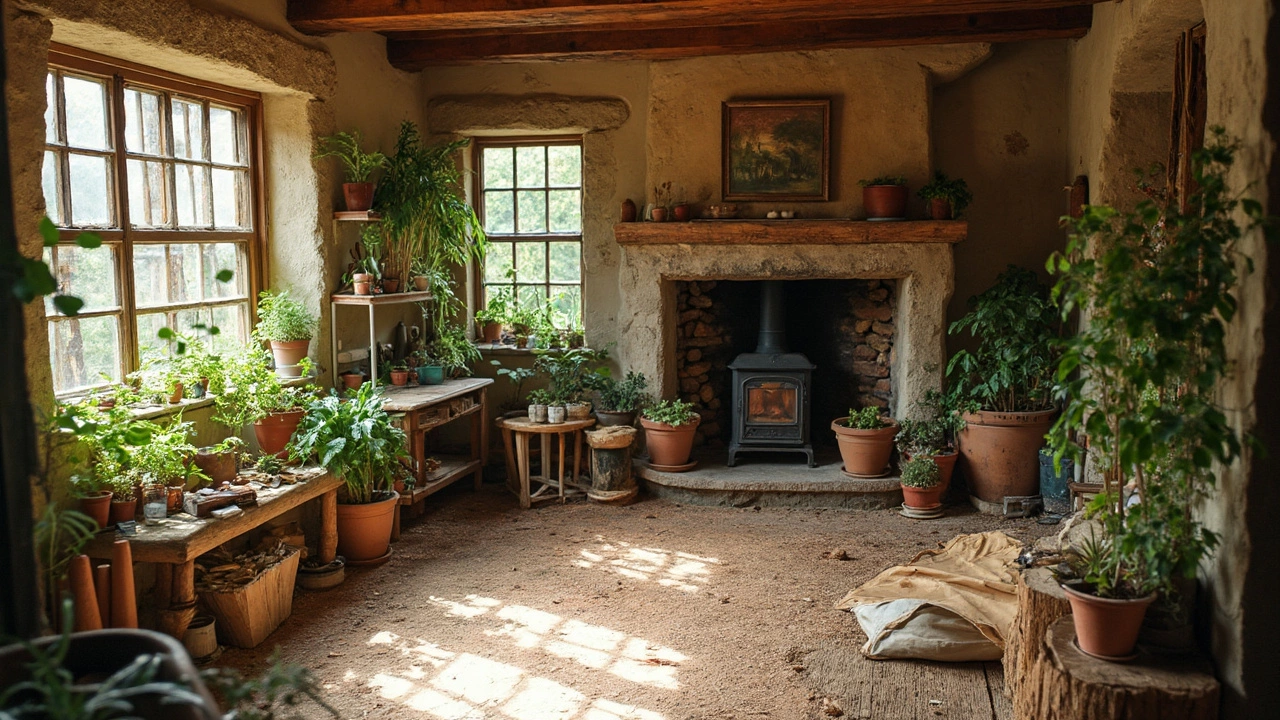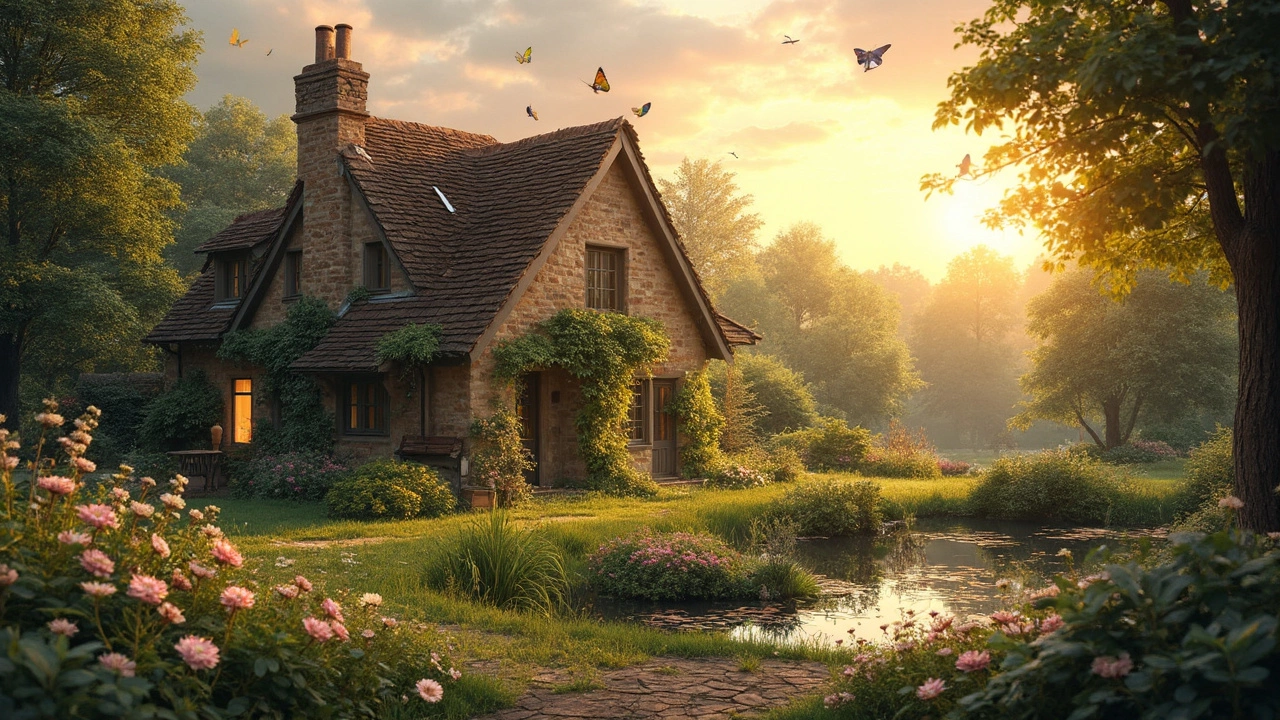So, you're thinking about living in a cottage? It's not just about picturesque views and charming picket fences—though those are definite perks. Cottage life often means stepping into a world that's more in sync with nature and possibly lighter on the planet. That sounds pretty good, right?
First off, cottages can be a win for those wanting to lower their environmental impact. Many cottages are built with eco-friendly materials and designed to use less energy. Plus, if you're growing your own veggies out back, that's a step towards sustainable living.
But before you pack your bags, consider the practical side. Are you ready for a life with perhaps less space and a bit more DIY maintenance? You might need to get comfy with fixing stuff yourself, like learning how to handle a leaky tap or mow that adorable little lawn.
Making it work sustainably means thinking about everything from solar panels to composting toilets. If reducing waste and living green are your goals, a cottage could be the perfect place to achieve them. And while it's not always easy, the rewards—like those serene mornings with birds chirping—make it worth the effort.
- The Appeal of Cottage Life
- Eco-Friendly Living
- Practical Considerations
- Tips for Sustainable Cottage Living
The Appeal of Cottage Life
Living in a cottage is like stepping into a simpler, more grounded way of life. Sure, cities buzz with energy, but escaping to a cottage offers peace, quiet, and room to breathe—literally and figuratively. Let's dive into why many are falling for the charm of cottage living.
One of the biggest draws is the connection to nature. Imagine waking up to birds chirping instead of traffic noise. Cottages are often nestled in nature, whether it's by a lake, in the woods, or near rolling fields. This means more time outdoors, fresh air, and often an amazing view from your window.
Eco-friendly living is another perk. Many cottages are designed to be energy-efficient, with options for solar panels and rainwater collection systems. By living in a way that's conscious of the planet, it's easier to reduce your carbon footprint.
- Cost-effective: Cottages can be more affordable than city homes, both in terms of the initial purchase and ongoing costs. Less space often means fewer furnishings and lower energy bills.
- Simplicity: Life in a cottage often strips back to essentials, focusing on the things that truly matter—like that leisurely cup of coffee on a quiet porch.
- Community: Cottage living often comes with a strong sense of community. Neighbors are fewer but often form tight-knit bonds, supporting each other in both simple and meaningful ways.
- Personal projects: With space to explore hobbies, whether that’s gardening, woodworking, or crafting, cottages offer the perfect retreat to invest time in activities you love.
In Ireland, for instance, some folks prefer cottage living for its quaintness and historical charm. Renovating old stone cottages to blend modern comforts with traditional aesthetics is a trend that continues to grow.
However, it's important to approach it realistically. While the idea of cozy nights by the fireplace is tempting, it's also worth considering practical aspects like maintenance and distance from urban amenities. Choosing a cottage to live in brings with it a unique blend of rewards and challenges that makes the lifestyle appealing but requires some thought.
Eco-Friendly Living
Going the eco-friendly route in a cottage isn't just about looking the part; it's about walking the talk. At its core, living in a cottage often involves using less energy, which is great for both your wallet and the planet. Most eco-friendly homes are designed to be more energy-efficient, often featuring options like solar panels for electricity. If the idea of harnessing the sun's power gets you excited, this could be a game-changer.
Another big perk is the chance to reduce your carbon footprint. Many cottages use sustainable materials like reclaimed wood or natural stone, which offer durability without the environmental cost of new materials. Don't underestimate the satisfaction of living in a home that's both stylish and sustainable.
Water conservation is another cool aspect. Some eco-friendly homes integrate rainwater harvesting systems, a handy way to collect and use rainwater for your garden or even household chores. Plus, energy-efficient appliances can drastically cut down on water usage.
If you're thinking, "but what about waste?" - composting can be your best friend. With a small space dedicated to composting, you can turn kitchen scraps into nutrient-rich soil for that veggie garden you've been dreaming about. It's a win-win for you and your garden.
To get a clearer picture:
- Solar panels can cover up to 70% of a cottage's energy needs, significantly reducing electricity bills.
- Switching to LED lighting can save about 80% more energy than traditional bulbs.
- Homes using reclaimed materials can reduce the carbon emissions associated with manufacturing new materials by around 50%.
Living in a green home means embracing a lifestyle where sustainability is second nature. With these steps, a cottage can become a haven for you and the environment.

Practical Considerations
Alright, let's chat about living in a cottage and what it really takes. It's not all sunshine and roses—though wouldn't that be nice? There are some practical things to think about if cottage life is calling your name.
First up, space. Cottages are typically smaller than your average house, so you won't have tons of room for clutter. This means embracing a minimalist lifestyle might be on the cards. You'll have to decide what's essential and what's just taking up precious space.
Then there’s maintenance. Unlike urban apartments where you might call in a handy-person, living in a cottage often means rolling up your sleeves. Whether it's cleaning gutters or fixing a fence, DIY becomes part of your vocabulary.
The commute is another thing. If you're in a really remote spot, getting to work or picking up supplies could take longer. Factor in how much distance you're comfortable with. Are you okay with longer drives to the grocery store or having a gas tank rack up miles?
And don’t forget about utilities. How will you heat your cottage? Many rely on wood-burning stoves—which can be cozy and energy-efficient if managed well. But you'll need to stock up on firewood and know how to maintain fires safely.
Another biggie is internet connectivity. Rural areas might have slower connection speeds or spotty service, so check what's available before making the move. Especially if you're planning to work from home, a reliable internet connection is crucial.
Here's a quick peek at what some folks spend monthly on cottage upkeep:
| Item | Monthly Cost (EUR) |
|---|---|
| Utilities (electricity, heating) | €100-150 |
| Internet | €40-80 |
| Maintenance Supplies | €50-100 |
| Fuel (if commuting) | €80-120 |
Overall, rocking the cottage lifestyle can be both rewarding and challenging. If you're up for the quirks and ready to adapt, it can offer a peaceful and fulfilling way to live.
Tips for Sustainable Cottage Living
So, you're set on making your cottage life as eco-friendly as possible. That's awesome! It's all about small changes that lead to big impacts. Ready to dive into some practical tips?
First up, consider energy efficiency. Think about installing solar panels on your roof. They might be a bit pricey upfront, but the savings on your electric bill will make you smile in the long run. Plus, it's a solid step toward a sustainable living.
Next, let's tackle water conservation. Harvest rainwater for your garden using a simple rain barrel. It's a great way to keep those veggies happy without raising your water bill. And while you're at it, swap out old faucets and showerheads for low-flow versions that save water without sacrificing that nice, hot shower.
- Insulation: Make sure your cottage is well-insulated. This keeps you cozy in winter without cranking up the heat.
- Composting Toilet: It sounds a bit wild, but these toilets can save a ton on water usage and provide nutrient-rich compost for your garden.
- LED Lighting: Switch those bulbs to LEDs. They last longer and use way less energy.
Don't forget about where your food comes from. Plant a small vegetable patch or even just some herbs on the windowsill. It's incredibly rewarding to grow your own food, and you can't beat the taste of fresh produce.
If you're keen on reducing waste, a compost heap is a must. All your kitchen scraps can go there, and in time you'll have perfect compost for all that garden work.
One great move is to support local businesses. Whether it's fresh produce from a nearby farm or handmade furniture from a local craftsman, shopping local helps cut down on carbon emissions from transporting goods long distances. Plus, you're helping your community thrive.
Living in a green home, especially a cozy cottage, isn't just about the structures and systems, it’s a lifestyle choice that promotes balance with nature. So, embrace these tips and watch your eco-friendly cottage dreams come alive.
